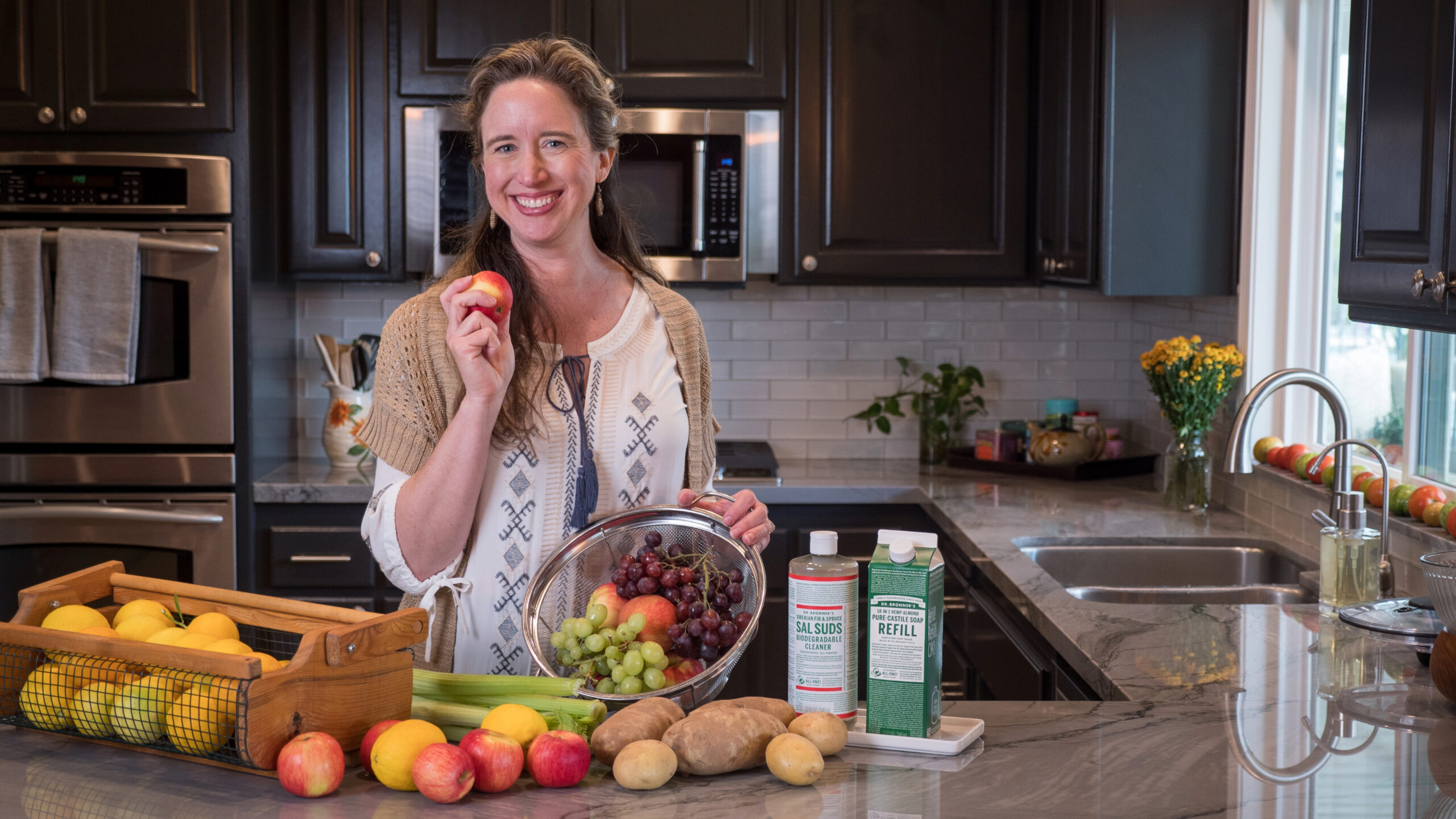
I am a sucker for the gorgeous rainbow variety of fruits and vegetables. Farmers Markets and produce sections of grocery stores are like art exhibits, except I get to take it home!
Blue-fleshed potatoes, rainbow beets, candy-cane striped radishes, Cherokee purple tomatoes, orange watermelon, black grapes… My garden tends to include some quirky but beautiful edibles, like the Zebra-striped tomatoes, which were technically a very happy accident – the pot at the nursery said “Beefsteak”, but nature knew I needed this blush-and-green striped variety, once I stopped waiting for them to turn red! You can see the Zebra-striped tomatoes on my kitchen windowsill in the video.
Whatever types of produce you come home with, washing it does not need any specialty or fancy solutions. I choose to wash all my produce, even if I won’t be eating the peel or rind, because I don’t want any debris on the outside to get transferred to the inside when I cut or peel it. Both organic and non-organic produce can be coated in various waxes or shellacs, which washing can help remove. Washing will also help remove surface pesticides and herbicides on sprayed produce, though it will not remove any chemicals that the produce has absorbed. Washing also removes any stowaways hiding in the leaves.
For guidance on purchasing organic vs. non-organic produce, the Environmental Working Group’s annual Dirty Dozen & Clean Fifteen lists can help you choose where its most essential to eat organic options.
The features you want in a produce wash are:
- Effective
- Non-toxic
- Residue-free
While these are each equally important, the last one is why you can’t use most conventional soaps or detergents on produce. The scents are meant to linger by leaving residues on surfaces. Who wants their salad to taste like some lingering artificial fragrance?
However, both Dr. Bronner’s Pure-Castile Magic Soap and Sal Suds Household Cleaner are effective cleansers, contain mild plant-based surfactants, and are exceedingly clean rinsing and make great options for washing produce. Neither product leaves any soapy taste behind and all of the Castile Magic Soap scents work equally well.
How to wash produce with Dr. Bronner’s
For most produce, wait and wash them right before you are going to eat them. Most produce has a protective microbiome, and as soon as this is washed off, the fruit or veggie starts to degrade. If you do have to wash ahead of time, be sure to dry them thoroughly. The exception to this is robust leafy greens like chard, kale, and romaine, which can be refreshed and crisped in the fridge after a washing and spin in the salad spinner.
As with all the versatile uses of both of these Dr. Bronner’s products, you have options.
For a single fruit or vegetable:
- One dollop from a foaming pump dispenser: 1 part Castile Magic Soap to 3 parts water.
- One drop of Magic Soap or Sal Suds or Bar Soap lightly lathered in hands.
- Rub and rinse.
For a bunch of produce:
- Fill a sink or bowl with water and add a small squirt of Castile Magic Soap or a smaller squirt of Sal Suds. If using Castile Bar Soap, lather it into a bowl of water.
- Dunk the produce, swish, and rinse.
A couple “do nots” with produce
- Do not soak produce. Most produce is quite absorbent and will become waterlogged and mushy. Plus, if the fruit or veggie absorbs the soapy water, that will affect its taste.
- Neither vinegar nor baking soda are effective cleaners on fruit. Baking soda works by scouring, which is not needed here. Vinegar will lift light amounts of grease which is not the primary type of debris on fruits and veggies.
Special produce cases
Mushrooms
Mushrooms easily absorb water, so it is best to wipe them with a soft, damp cloth.
Root vegetables (potatoes, carrots, beets, etc.)
Scour these with a good stiff brush, but they don’t really need soap.
What are your favorite fruit and veggie preparations?
I am always looking for tasty and beautiful new salads, smoothies, and other edibles. The salad you see me make at the end of the videos is one of my favorite go-tos, rather a Waldorf inspired blend of apples, grapes, celery, and walnuts. Would you share some of your favorite combos?
Further reading
Sal Suds cleaner shows >60% biodegradation after 28 days per ISO 14593.

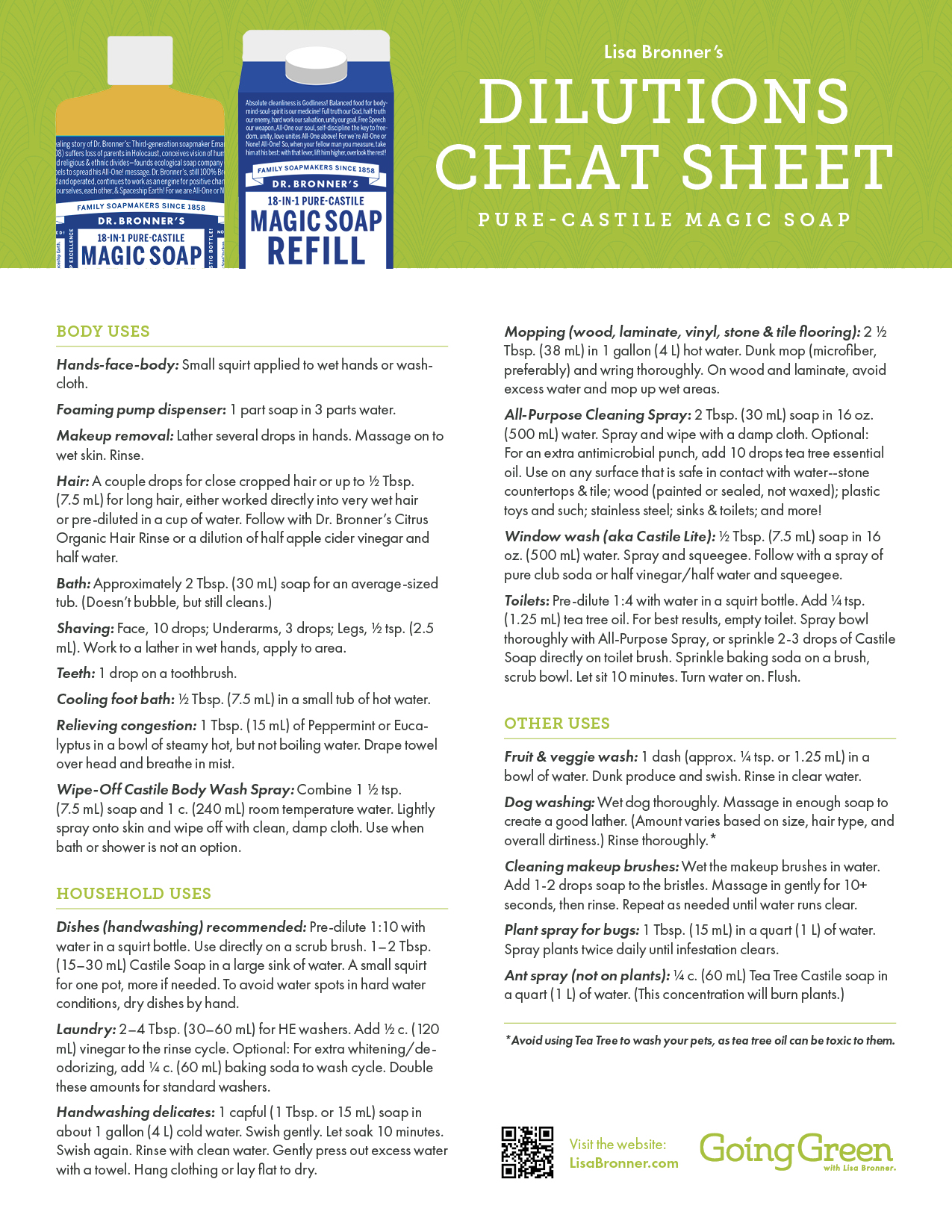
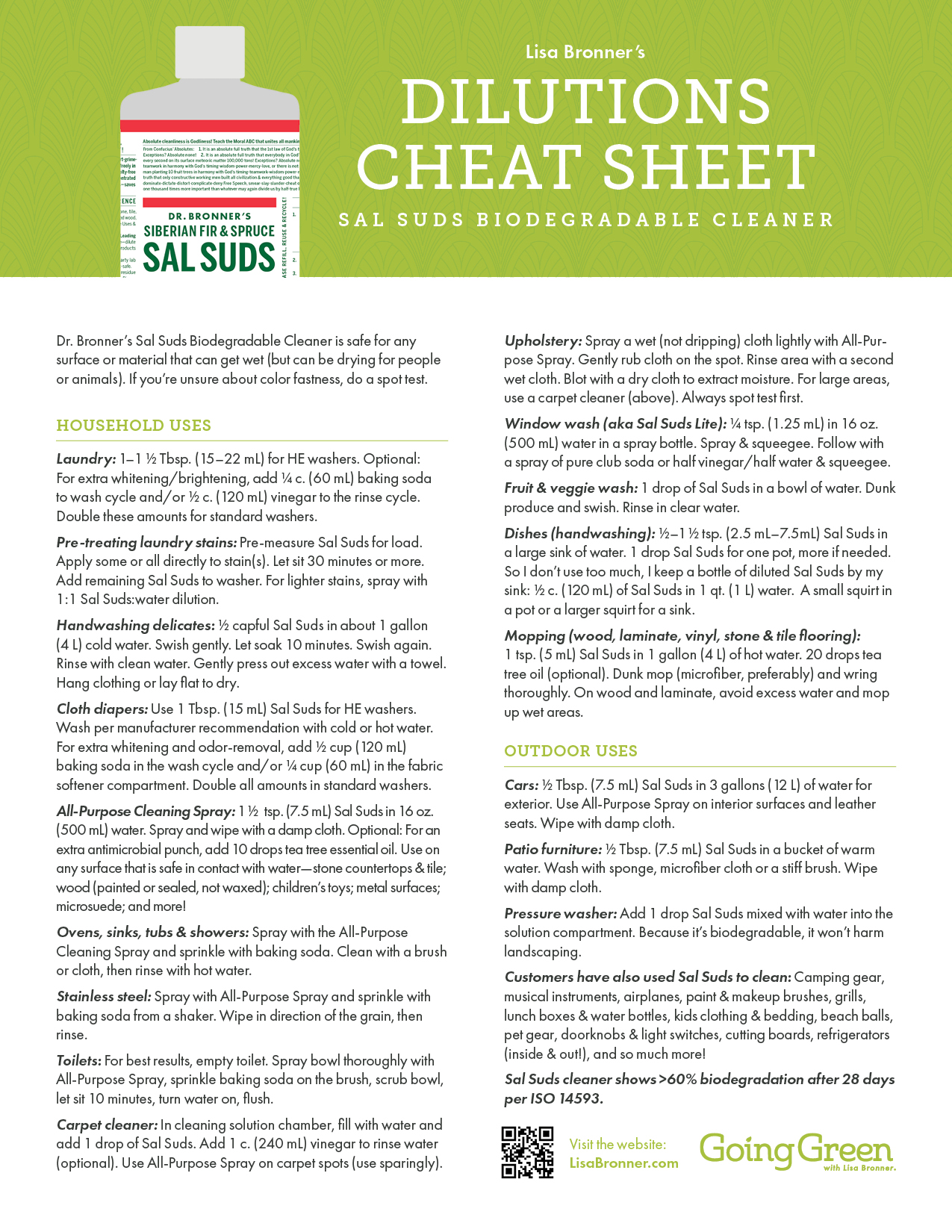
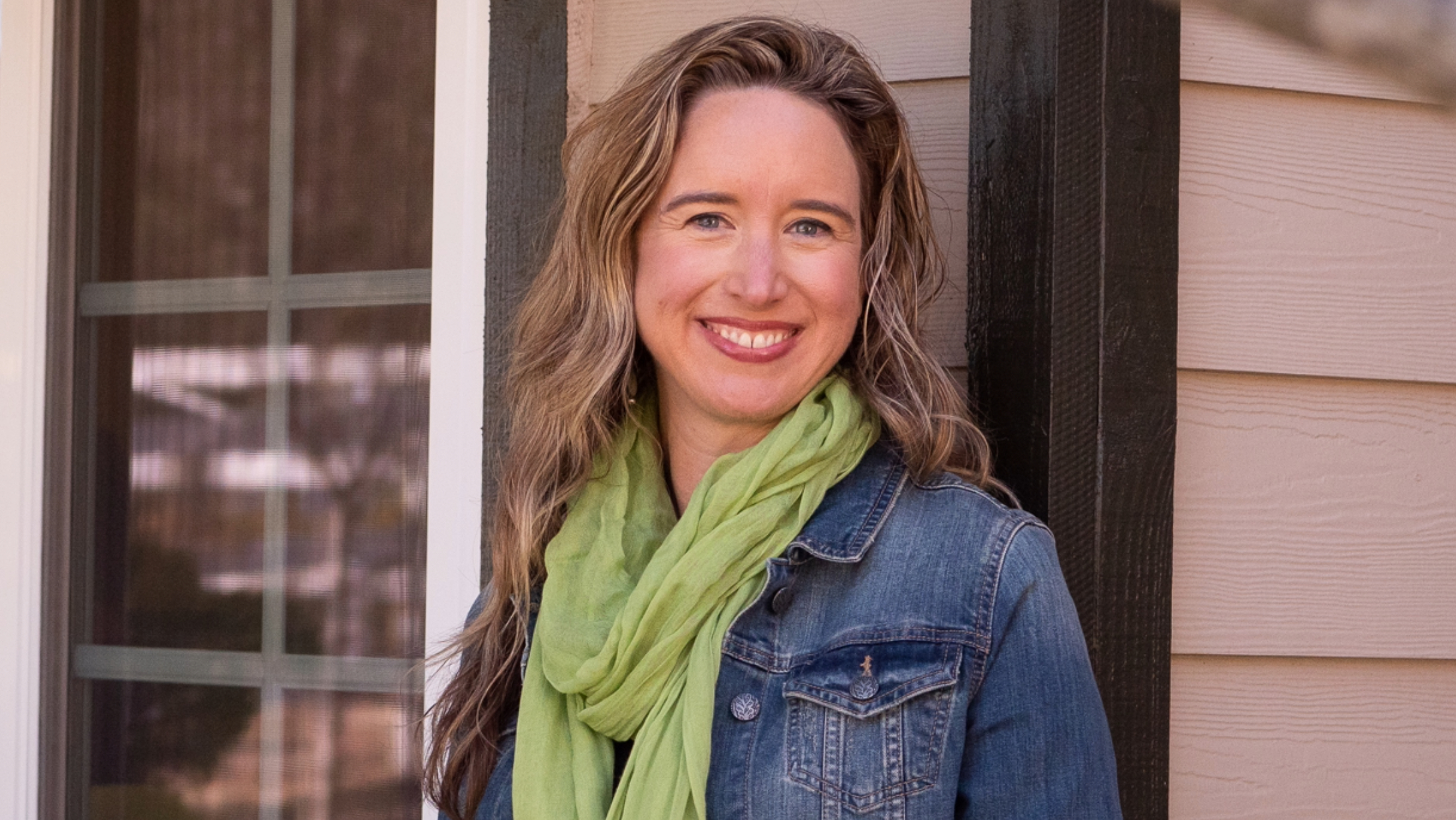
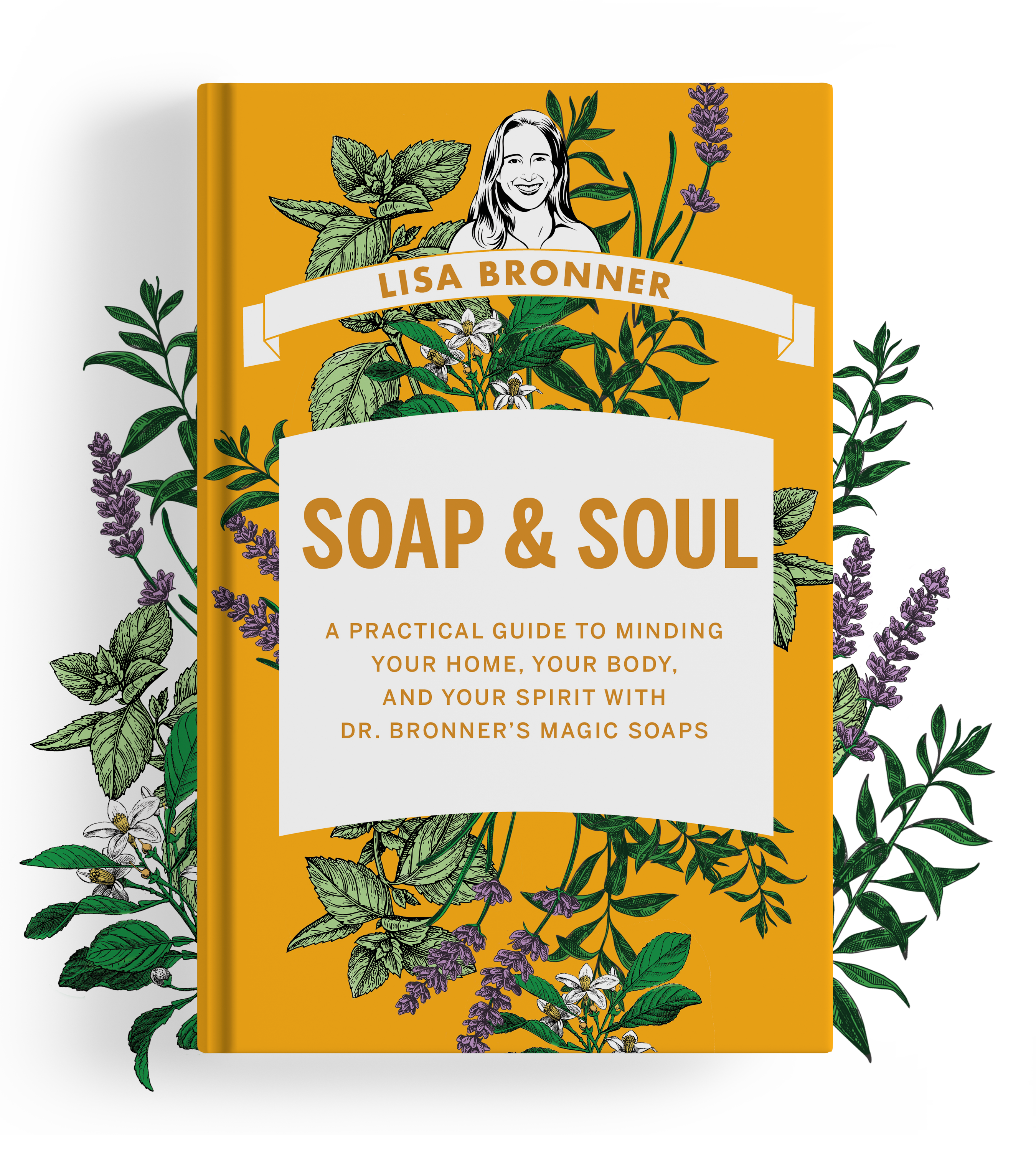
Does your product remove wax from apples?
Hi Zoey – Yes, both the Castile Soap and Sal Suds will remove wax from apples. This is because the waxes are commonly made up of long chain fatty acids and triterpenes, which are nonpolar compounds. The tail end of soap/detergent molecules are attracted to such nonpolar compounds and are able to pull them away from the surface of the apple. Dr. Bronner’s Castile and Sal Suds are particularly helpful in this because neither deposit any sort of residues on surfaces, leaving the fruit’s surface clean and ready to eat.
For a single fruit or veggie, use one dollop from a foaming pump dispenser (1 part Castile to 3 parts water), or one drop of Castile or Sal Suds will do the trick. For a larger quantity of produce, fill a sink or bowl with water and add a small squirt of Castile or a smaller squirt of Sal Suds.
Hi Lisa! I am wondering which type of castile soap is best for fruit wash. Should I be using unscented or are the soaps with essential oils fine?
Hi Anna- All of our scents work equally well and don’t leave residue behind. If you are concerned though, I recommend the Unscented or a “foodie” scent such as Citrus.
Hello, I’d like to apply Dr bronner’s castille soap to a tree infected with soft body insects with an electrical power washer. The tree is high. I am fully aware of the power of the stream of water but I can easily deal with that. I’d only like to know if I need to add the soap as is directly in the sprayer tanks, or that Castile soap also needs dilution
Thanks, Ariel
Hi Ariel – I have not tried this and can’t say how it will work, but as far as adding the soap goes, you can add the soap to the water in the sprayer tanks. If you’ll be spraying over your head, I do recommend safety goggles to keep the soap out of your eyes.
I liked your video: short and to the point.
I am planning to stay with friends in Nepal. I have been reading online about the fruits and vegetables. The WHO says they need to be cleaned thoroughly to remove salmonella, parasites, viruses, and bacteria. I am wondering if bringing Dr. Bonners and using it to clean my fruits and vegetables would be a good solution
Hi Aimei- Yes, that is an excellent idea. The Dr. Bronner’s Castile BAR soap might be the easiest to travel with – no spilling and it works just as well as the liquid!
I read some where that you could soak a plant before bringing it indoors. Not just the leaves but the whole pot. I’m trying to get the ratio of soap and water to do this. Can you help me??
Hi Trish – I am not sure about what was recommended for soaking, but the soap does not work systemically. Meaning that saturating the soil with a soap/water dilution will not help deter pests. I am also not sure about the impact on the roots if there were soaked in soap/water. I’m sorry not to be of more help. Is this what you were wondering?
Hello,
My long time produce wash, like many things, now comes with a flashy new label, and a change in ingredients. I went looking for a new product; I found one that is labeled as ‘organic’ with four ingredients—two are fine, one I am not familiar with and one I would like to avoid.
The two ingredients that are okay for me are water and vinegar. The one I am unfamiliar with is Soap Nut?
After contemplating these ingredients, I wondered why I could not just mix water, vinegar and some Dr. Bronners Liquid Castile Soap (I use for many things around the house, why not a produce wash, I thought!)
I generally wash solid items (apples, pears, oranges, etc.) by hand with a little wash product, soak blueberries, strawberries and cherries for up to five minutes, swishing around frequently and submerge individual leaves from leafy greens in a bath and then swish and rinse all of the above.
Could you recommend a good ‘recipe’ for mixing these ingredients together for a produce wash for solid fruits and veg, softer things like berries and also leafy greens? Thank you!
Hi Ann – The Castile soap makes an excellent produce wash. You do not, however, want to mix Castile soap with vinegar. The two ingredients react together and form a useless oily substance. (You can read more about that reaction here.) For individual pieces of fruit or veggies, I use a dollop from my foaming pump dispenser (1 part soap with 3 parts water) or just a drop of soap per piece of fruit. You can also dilute 1/4 c. soap in a quart of water and put it in a spray or squirt bottle for this. For a larger bunch, such as leafy greens or a basket of strawberries, fill a large bowl with water and add 1/4 tsp. of water. Swish the produce or rub it gently and then rinse.
There is a lot of hype right now about Apeel being sprayed on produce, even organic ones. They also say that it cannot be washed off without destroying the fruit! I’m wondering if Sal Suds is strong enough to get through this chemical?
Hi Mara – There is certainly a lot of chatter about Apeel and it is approved for use on organic certified produce. We haven’t had a chance to do any testing around the impact of our Sal Suds on it. Sal Suds likely would be able to remove anything on the surface of the fruit, but it wouldn’t be effective against anyone that has penetrated into the skin.
Oh no! I think the video must have gone bye-bye. I’d love to see how it’s done.
Thanks for the heads up, Gina! Unfortunately, the original video which was done in my very earliest days of blogging has gotten all glitched up and I had to remove it. I will definitely redo this one in my next round of filming.
Well most of our Castile soap in the house is in bar-soap form, so there’s that……
Hi Pamela – Don’t let that stop you! You can either use your hands to suds up some bar soap in a bowl of water to wash produce, or just get some suds on your hands and wash a single piece of fruit. For more ideas on the many ways to use the bar soap for all the same uses as the liquid, check out this Cheat Sheet! https://www.lisabronner.com/bar-soap-dilutions-cheat-sheet/
Can I use ANY of your brand liquid soap? For example, I’ve been using the hemp tea tree oil and hemp almond liquid soap to wash fruits and veggies. Do those remove pesticides?
Hi Yon – Yes, you can use any of them. They all have the same soap base, just different essential oils for scent. The soap is what’s doing the work here, so any of them are equally effective.
Can I make a spray? If so, how? Thanks!
Hi Karin- I think my All-Purpose Spray dilution would be great for washing produce. That’s ¼ c. Castile OR 1 Tbsp. Sal Suds in 1 qt. of water.
You can make a spray, but you remove more pesticides with even a short soak.
It is already so economical to soak you probably aren’t saving more than a fraction of a penny by spraying.
During the winter months, I purchase frozen fruits and berries. Do you have to wash them as well?
Hi Zee- There’s no need to wash frozen berries first. The American Frozen Food Institute (AFFI) clarifies that frozen fruit is safe and ready-to-eat straight from the package.
How long should fruits like strawberries, raspberries, blackberries, and blueberries sit in the mixture?
I know raspberries are extremely sensitive but they also are the most likely to carry bugs/worms etc
Hi Jaclyn- Because these berries are so absorbent (which is why buying them organic is very important), you would not want them sitting in the wash water very long. It wouldn’t be harmful to the eater, but the berries might acquire a slight soapy tang. So give them a good swish and rinse them off.
Maybe give them a quick dip in a vinegar/water solution rather than a soapy water.
I know that my cucumber is always extremely waxed I’m excited to create a veggie wash spray with your recipe!
I love Bronners products
For washing fruits and vegetables is the lavender castille okay to use or does it have to be scent free?
Hi Harley- Any of our scents will work! Our soaps are clean rinsing so there wouldn’t be any residue remaining, although it wouldn’t be harmful if there was.
On the picture, there are lots bubbles on the leafy veggie on the left. Isn’t that too much?
I have a big Stainless Steel bowl in which I wash my veggies. I never count how much soap I squirt in. Water turns white and there are bubbles but not as much as that on your picture. I am always wondering if too much is bad for my health.
Hi Stephanie – Our soaps are clean rinsing so there wouldn’t be any residue remaining, although it wouldn’t be harmful if there was. Keep in mind that Castile Soap doesn’t produce the copious bubbles of other products, including our Sal Suds. As much as we’ve been trained to think otherwise, bubbles aren’t a sign of cleaning power. If the amount of Castile you’re using does the job, stick with it.
Hi there! In a 16 fluid ounce bottle, do you think a 1/2t of pure castille soap mixed with the 16oz of water would suffice for a produce wash?
I’ve also found that washing my leafy greens in a bowl with salt has done wonders!
Hi Natalia- That dilution sounds perfect!
Ive read that Sodium Laurel Sulfate is toxic. In Sal Suds , how is your different?
Hi Penny- It’s great that you pay attention to labels and ingredients. Sal Suds, our household cleaner, is formulated with SLS because of its keen ability to cut through grease and grime and to generate suds. Studies have consistently shown that SLS is safe to use in low concentrations and in products that are meant to be rinsed off – both of which are true of Sal Suds. SLS can be a skin irritant for some people because it can be so drying. It is so good at picking up oils that it pulls them right out of our skin. You won’t find SLS in any of our personal care products, and personal care products (shampoos, soaps, toothpaste and such) that include it should be avoided. If you have concerns about Sal Suds, our all-natural Castile soap does an excellent job of household cleaning as well. For a deeper dive into SLS, refer to my blog post here: https://www.lisabronner.com/there-is-no-cancer-risk-from-sls-sodium-lauryl-sulfate/
If one was soaking their produce in Sal Suds for an hour, would the fruit and vegetables absorb the chemicals in the soap? Such as SLS or other ingredients that shouldn’t be ingested?
Hi Alley- An hour soak doesn’t sound like a good idea. I think the produce would likely absorb the water and turn mushy. It would be better to wash the produce briskly and rinse it off.
Hi! I’ve been using a squirt of Sal Suds in a bowl of water to wash produce for years. I also often just use my foaming handsoap (just Castile soap and water) to wash a single item like an apple. But the recent official advice about washing produce to prevent Coronavirus specifically says not to wash produce with soap because “doing this could lead to health problems, such as mild gastrointestinal irritation with nausea, vomiting, diarrhea and abdominal pain.” Is that a concern with Dr. Bronner’s Castile soap or Sal Suds? I wondered whether it applies because the ingredients are more natural than most commercial soaps.
Hi Jenni- Thanks for bringing this up. I looked around at the statements about this, and the concern is about ingesting soap. Many commercial hand soaps and dish detergents are designed to leave things on the skin, such as smoothers, moisturizers, and fragrances. These would not be good to ingest, and may cause stomach upset. However, Dr. Bronner’s products are designed to be exceptionally clean rinsing. So long as you rinse the produce after washing, the Castile Soap or Sal Suds will do a great job at cleaning your fruits and veggies.
In regards to veggie washing with your products …. which is best Castile soap (baby unscented) or
Sal Suds? What is the difference?
Thank you
Hi Lauria- Sal Suds or Castile Soap will clean your produce equally well. Likewise, any scent of Castile Soap will do the job. Some do prefer a mild scent, such as Citrus, Almond or Unscented, in the event a small amount of soap is not rinsed off produce. For a detailed explanation of the difference between Sal Suds and Castile Soap, check out my blog post, “Which One Should I Use?” at https://www.lisabronner.com/sal-suds-or-castile-soap-which-one-should-you-use/.
Hi, I’m wonder if you would know the answer to this question. Is 18 in 1 effective to destroy CoVID 19 on my fruits and veggies? Since the Castile soap contains no detergents or foaming agents, is it still effective?
Thanks,
Hi Michelle- Usually when we’re washing produce we’re just trying to get rid of field dirt and maybe aphids or the like, but we’re not usually talking about germs. Previously I would say “a small squirt of Castile in a bowl of water” and then dunk the produce, swish and rinse. However, for germ-eradication, my All-Purpose Spray dilution, ¼ c. Castile in 1 qt. water, which is much stronger than the squirt in a bowl, will do the job. Spray the produce with the All-Purpose Spray, rub it around the produce (if we’re talking lettuce, spray the leaves and massage it around) for 20 seconds and then rinse thoroughly. You mention the word destroy. A word here about how soap works. Detergents and soaps, including our Pure-Castile Soaps, work effectively by attaching to dirt, germs, and grime and rinsing them away, leaving clean hands and surfaces (or fruits and veggies in this case) behind. That’s why that 20 seconds is important. That’s the amount of time it takes soap to latch onto dirt and germs. Dr. Bronner’s soap products are effective cleaners but are not disinfectants since they do not contain a pesticide and do not kill, but instead remove germs, dirt and grime from surfaces. Our soaps don’t kill viruses, but they don’t need to. They remove them completely from hands and surfaces.
Actually, scientists are saying that soap destroys viruses, including Covid-19.
https://www.nytimes.com/2020/03/13/health/soap-coronavirus-handwashing-germs.html.
It won’t kill bacteria and some other things, but it seems good for the current crisis. I bought some of your unscented Castile soap for just this purpose. Thank you!
Yes, I’ve been using the Castile Soap regularly for this as well.
[…] The wax that is put on certain non-organic produce to make it more presentable and even preserves it a bit can be trickier to eliminate. However, Sal Suds is the best option for this job. Take that big bowl of water and add the two drops of Sal Suds. Dunk the produce and take a soft cloth to rub the wax off gently. Rinse and dry and there you go. Check out a quick video about it here. […]
I use Dr Bronners mild baby liquid soap to clean all produce. I add a few drops to a jug of warm water and gently rub, anything and everything – grapes, strawberries, cherries, tomatoes, even telegraph cucumbers I’ll wet my hands and add a few drops, rub my hands together to get a bit of foam and rub all over a cucumber. Then rinse well under the running tap
Lisa, what are you thoughts, is Sal suds better??
Thanks!!
Hi Jane – What you’re doing sounds great! I generally go to the Castile soaps for washing organic produce, but if I’m washing waxed produce, I’ll use the Sal Suds, which is better at cutting through that food grade wax on apples and such. The Castile has the added benefit of being able to kill aphids or other stowaways, so if I have some leafy greens with passengers, I go for the Castile.
Hi Lisa!
I use Dr.Bronners Castile soap ALL the time and just recently started using sal suds to wash dishes. I’ve been washing most fruits and veggies with the Castile soap the same day I buy them as a batch and they do not go bad. They last all week in great shape. I do let them dry before storing them. We grow some of our fruits and veggies and try to buy organic about 50-80% of the time. However money is running tight lately 🙁 I know apples and pears are at the top of the dirty dozen list, do you think that if I buy conventional, by washing and peeling them I’ll make them safe enough for my toddler to eat them? Do you prefer sal suds or Castile for pesticide removal?
Thanks!!!!!
I know this is from 2015 but there are two pieces of information you need to know. Is the produce hydrophilic? for example Chia seeds, and has a liquid soluble pesticide been sprayed on the plant? If yes to both, it can’t be decontaminated with washing and you’d have to buy organic.
You don’t necessarily have to buy organic though if you know what the farmer is using or is organic without certification.
Been using Dr Bronners Sal Suds for vegetable washing for over 20 years. The bottle no longer says for washing vegetables but is safe to do so. Recommended to me by a leading Dr of Oriental medicine in West Palm Beach One drop is all it takes!
I’m thinking of letting Mirry cover for me when I go on vacation! Yep, Darlena, the castile is an awesome soap for dogs. The combo is Peppermint and Eucalyptus that my dad used and called “Euco-Peppo Bear Wash” (just a household joke – we didn’t market it). It works great, though.
For brushing teeth, the Castile soap is also a possibility here. It does taste like soap, but if you go with the peppermint, you do get that minty freshness. If you’d rather opt for a more traditional toothpaste, look for ones without Sodium Lauryl Sulfate which can be irritating and lead to canker sores.
All the best,
Lisa
Just bought my first dr bronner products and am working towards all green. Sala suds and the gentle Castile. I am very chemical sensitive. Can you advise what to use for bathing dogs and brushing teeth? Thanks, Darlena
Darlena, I have been using the castile unscented on my two labs. One is a poop roller (Thank god only deer etc and not other dogs poop) the other has very bad allergies since moving here to Florida. Have to say so far so good and we have to bathe them once a week. It doesn’t require a lot of soap to get a nice sud and to get them clean. I think Lisa mentioned to me peppermint and something else will have to go back and read her reply. Oh and their coats are very soft after and we didn’t get that stench of wet dog after bathing either which is a bonus in itself.
Mirry
Good morning Lisa
Thanks for the confirmation. I am eagerly awaiting my delivery of products today. I am looking forward and excited to the transition and I definitely know where to come for assistance.
Mirry
Hi Ginger & Mirry – Yes, Sal Suds works great to wash any produce. All it takes is a quick wash and rinse. If you had a lot to do, you might fill the sink and add a couple drops of Sal Suds. Dunk in the produce, rinse it, and you’re good to go.
Mirry, let me know if you run into any questions as you make this transition. There might be a steep learning curve at the outset, but pretty soon it’s old hat.
All the best,
Lisa
Hi Lisa
After spending weeks researching how to live green etc, I came across a lot of products using Dr Bonner products. Originally from the UK I had never heard of this and now I have found your site, its fantastic.
Long story short we have moved literally across the states for work after leaving the military after 23yrs so have rented out our house and are now getting ready to rent ourselves. This is going to be an ideal opportunity to go green, new house, new journey.
I was wondering also if I can use this wash on all types of fruit and veg and have found an organic farmers market here although it only exists from April – September.
I am changing everything in our home, even down to washing the dogs, so will report back with an update, were so exited, even my husband, which is a huge undertaking.
Just a side note to your info about produce. I worked for a software company back in the UK, we also wrote software for some of the largest growers here in the states. On a tour around a produce grower, I was horrified to learn that once fruit and veg is picked, a lot of it is stored in bins and stored in units that have all the oxygen taken out of the air as this stops the fruit from spoiling. This can be stored for a very long time and you can only enter the store in a special suit. Long story short, this fruit and veg that shows up in our stores can be 18 months old before we even get to eat it. That was an eye opener for me and pretty shocking.
Mirry
Hello- I’m glad I found this website, very informative.
Quick question- Is this Sal Suds veggie wash recipe work for all veggies and fruit, even without a waxy buildup, (strawberries, lettuce, carrots) I have been using vinegar, but have found quite time consuming. If so, do i just rinse off quickly, like your video?
Thanks so much-
Ginger
Hi Kristine – The Sal Suds will wash off any wax and pesticides that are on the outside of the produce. However, pesticides definitely absorb into the produce, becoming more concentrated inside the skin itself. This is why peeling non-organic produce is often recommended, if possible, and purchasing organic on certain thin-skinned produce (such as strawberries and peaches) is also good if possible. Pesticides can absorb into the flesh of the fruit, but not as strongly.
This isn’t the end of the story, though. Part of the debate to label genetically modified organisms (GMO’s) focuses on the emergence of modified seeds for fruits and vegetables that then will make their own internal pesticides. One of these is a type of sweet corn (corn on the cob) that is now on the market (unlabeled)which contains the Bt toxin, an internal pesticide. Needless to say, these internal pesticides can’t be washed off.
This all certainly keeps us on our toes!
All the best,
Lisa
Bronners is such an amazing product line…thank you for your website too!
I’m following up on Rita’s question. I think she was asking if we are being protected from consuming pesticides by using Sal Suds on conventional (non-organic) produce. Will Sal Suds wash away just the wax or the pesticides too? I’m not sure if pesticides live inside produce too. Thanks in advance for your response!
Glad this helps!
Rita – Yes, there are two ways to be certain your produce is pesticide free: buy organic or grow it yourself (or a reliable friend).
All the best,
Lisa
I just received my first bottle of Sal Suds and love this tip. I’ve been looking for a quick and easy way to wash produce so I can feel better about what I’m eating. Sal Suds is my new go-to cleaning product for everything! Thank you!
Love your products. God Bless
Does this mean I don’t have to buy organic produce to eliminate the pesticides? I enjoy all your tips. Thanks.
Thank you for this idea!! Yet another great reason to love Sal Suds!!!